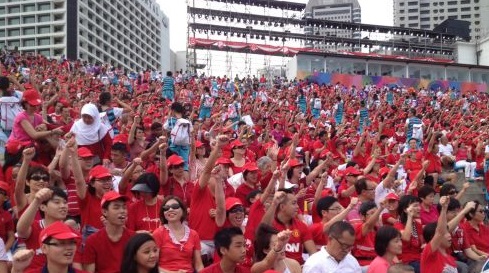A few of my friends started shaking their heads when they found out I had resumed a relationship with an old girlfriend. The reason? She is from Vietnam and her education is minimal. The most common reaction was – “Oh be careful, women from Vietnam just want your money.”
By comparison, everyone was very happy when I started the relationship before that – this girl was “acceptable” to Singapore society. She was from Raffles Girls’ School and had a degree in architecture. She played the piano and I remember my sister telling a family friend, “This one knows who Glenn Gould is.”
However, whenever I look at these two relationships, I tend to ask a different question – “Are native-born Singaporeans a dying breed?” My native -born ex-girlfriend has superb academic qualifications but lacks life skills. She can only mix with Caucasians or Singaporeans from a similar social background. Life seemed to fall apart the moment she quit her job. By contrast, the Vietnamese lady is confident with people from all social backgrounds and she’s full of ideas of how one can make a better living.
Unfortunately, the difference between these two ladies doesn’t seem to be limited to them. This personal comparison seems to be also true on the national scale.
Let’s start with surfing websites in Singapore — you’d get the impression that Singapore is a desperate backwater where subsistence farming is the economic activity of the chosen few. This is despite the fact that Singapore has consistently posted years of economic growth with low rates of unemployment. As far as many Singaporeans are concerned, the government has let in too many foreigners, thus making everything from housing to transport more expensive but increasing competition for jobs, thus lowering wages for Singaporeans, including professional, executive and middle class ones.
It’s a fact that housing in Singapore has become more expensive. In 2012, Singapore’s Business Times found that an HDB flat in Bedok cost more than a 12-acre pine island in Maine, USA. Other forms of infrastructure are also seeing similar strains.
The lost PMETs
The professional, managerial, executive and technical (PMET) group in particular seems lost. I’ve known enough retrenched professionals who seem unable to do things differently once they lose that job in either the civil service or a multi-national corporation.
While the influx of foreigners does have an impact on resources, these problems are not unique to Singapore. The global economy has been undergoing changes and given Singapore’s dependence on the rest of the world, it’s no surprise that Singapore’s economy has been affected.
What is interesting here is not the structural shifts but in the reactions to them. If you read the reactions in cyberspace, you’ll get the impression that Singaporeans are looking for a “government-led” solution.
One of the most prominent examples that comes to mind is a former Citibank sales manager whom I know. The man has a way of making people feel at ease and getting them to do things for him. When I first met him in 1999, he could pull $300,000 worth of unit trust sales in a single day. Unfortunately, he lost his job two-years later and he has remained unemployed since.
What’s striking is not the fact that he’s retrenched, but his reaction to it. His financial situation is such that not only does he need his friends to pick up the tab whenever he goes out, but he’ll need his bus card topped up. Despite this, he is unable to look for another source of income. He won’t take freelance work, including giving tuition. He won’t take a “humble job” like waiting tables, even if it would qualify him for workfare and other government assistance. He describes such activities as being “not worth it”.
Sadly, he isn’t the only one who thinks like this. Talk to enough Singaporeans about taking “low-paid” work and the common reaction is, “The pay is too low for us to survive and support our families. It’s OK for foreigners to take these jobs.” This sentiment is unfortunately illogical and worrying.
I see things differently because I’ve been a freelancer most of my professional life. However, it is worrying when you see people dependent on a single organisation for their economic and psychological well-being. It’s frightening when you see people react to a setback by doing nothing at all.
Back to my Vietnamese lady. Vietnam threw off French colonial rule and beat back both America and China after that. How did they do it? Much has been said of these wars but the point is, these people found a way of making their ‘home-ground’ advantage work for them, despite being physically pulverised by two of the biggest powers in the world. By comparison when you read the comments in cyberspace, Singaporeans have found reasons why they can’t win on their home ground.
Singaporeans do have advantages in terms of their education in English and they do have advantages when it comes to dealing with the international business community. However, the “other” Asians are catching up in this area and when all things become equal, our psychological inability to adapt to changing circumstances will ensure that we are a dying breed.

